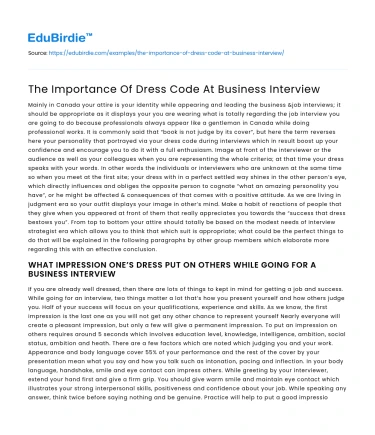Introduction
In the competitive landscape of job markets, first impressions are pivotal, especially during business interviews. A candidate's attire often speaks volumes before they utter a single word. It is an integral aspect of non-verbal communication, which can influence the hiring decision significantly. According to a study by the Center for Professional Excellence at York College of Pennsylvania, over 50% of employers consider the way a candidate dresses as a substantial factor when making hiring decisions. This underscores the importance of adhering to a dress code that aligns with the professional expectations of the industry. Despite the evolving norms towards more casual work environments, the traditional principles of professional attire remain relevant in interview settings. This essay explores the significance of dress codes in business interviews, illustrating how they contribute to a candidate's perceived professionalism, confidence, and cultural fit within an organization.
Professionalism and First Impressions
The concept of professionalism is often encapsulated by the adage "dress for the job you want, not the job you have." The attire a candidate chooses for a business interview can send signals about their understanding of the job's demands and their respect for the company's culture. According to a survey conducted by OfficeTeam, 80% of managers believe that clothing choices can influence an applicant's chances of being hired. Professional attire conveys a message of seriousness, attention to detail, and readiness to meet the challenges of the role. For example, a candidate interviewing for a position in a conservative industry, such as finance or law, is expected to dress in formal business attire, which typically includes a suit and tie for men, and a tailored dress or pantsuit for women.
Save your time!
We can take care of your essay
- Proper editing and formatting
- Free revision, title page, and bibliography
- Flexible prices and money-back guarantee
Moreover, dressing appropriately for an interview demonstrates a candidate's ability to conform to industry standards and respect the company's brand. A well-chosen outfit can complement a candidate's qualifications, enhancing their credibility and making them more memorable to the interviewer. In contrast, neglecting to adhere to the dress code can result in negative judgments about a candidate's professionalism. For instance, arriving in casual attire for a formal interview might suggest a lack of preparation or understanding, overshadowing even strong qualifications. Therefore, aligning one's attire with the expectations of the industry and the specific company is crucial in making a positive first impression.
Transitioning from the importance of professionalism, it is essential to consider how dress codes influence perceptions of confidence and capability. The way a candidate dresses can impact their self-perception and, consequently, their performance in an interview.
Confidence and Capability
Dress codes in business interviews not only affect how candidates are perceived by potential employers but also how candidates perceive themselves. Psychologists have long studied the phenomenon of "enclothed cognition," which suggests that the clothes one wears can influence one's psychological processes and performance. A study published in the Journal of Experimental Social Psychology found that wearing formal attire can enhance abstract thinking and give individuals a greater sense of power and control. This implies that adhering to a dress code can bolster a candidate's confidence, enabling them to present their skills and experiences more effectively during an interview.
For example, a candidate who dresses in a well-fitted suit may feel more authoritative and self-assured, which can translate into a more compelling delivery of their qualifications and achievements. This heightened confidence can also affect non-verbal cues, such as posture and eye contact, which are critical components of effective communication in interviews. Conversely, wearing inappropriate attire can lead to feelings of self-doubt and discomfort, potentially undermining a candidate's performance regardless of their competence.
Transitioning to the final aspect, it is vital to address the counter-arguments regarding the relevance of dress codes, particularly in industries with more relaxed cultural norms and how these perceptions may vary globally.
Cultural Fit and Counter-Arguments
While the significance of dressing professionally for interviews is widely acknowledged, some argue that rigid dress codes may not be necessary in all industries, particularly those with more relaxed or creative cultures. In sectors such as technology and design, where innovation and individuality are highly valued, traditional business attire may not be as relevant. Instead, companies might prioritize a candidate's skills and cultural fit over their sartorial choices. For instance, tech giants like Google and Apple are known for their informal work environments, where the emphasis is placed on creativity and collaboration rather than conventional dress codes.
However, even in these relaxed settings, understanding and respecting the company's culture is essential. A candidate's ability to gauge the appropriate level of formality for an interview can reflect their adaptability and awareness of workplace dynamics. Furthermore, the global nature of business today means that cultural perceptions of dress codes can vary significantly. In some countries, such as Japan, formal business attire is still a non-negotiable aspect of professional interactions, regardless of the industry. Therefore, candidates must research and consider the cultural context of the organization they are interviewing with.
Overall, while dress codes may evolve, they remain a vital element of the interview process. By balancing professionalism with cultural sensitivity, candidates can enhance their chances of making a favorable impression.
Conclusion
In conclusion, the dress code for business interviews remains a crucial component of the job application process, influencing perceptions of professionalism, confidence, and cultural fit. While the importance of attire may vary across industries and cultures, understanding and adhering to dress codes can significantly impact interview outcomes. Professional attire not only conveys respect and readiness but also enhances a candidate's confidence and self-presentation. As the job market becomes increasingly competitive, candidates must consider every aspect of their presentation, including their attire, to gain an edge in securing their desired positions. By recognizing the nuanced role of dress codes, candidates can better navigate the complexities of the interview process and position themselves for success.






 Stuck on your essay?
Stuck on your essay?

